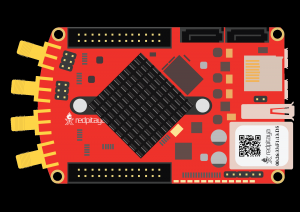2.3.6.8.1. I2C
2.3.6.8.1.1. Description
This example demonstrates communication with the EEPROM memory on the Red Pitaya using the I2C protocol. The code below writes a message to a given address inside the EEPROM and then prints the entire content of the EEPROM.
2.3.6.8.1.3. Code - C
Note
Although the C code examples don’t require the use of the SCPI server, we have included them here to demonstrate how the same functionality can be achieved with different programming languages. Instructions on how to compile the code are here.
/* @brief This is a simple application for testing IIC communication on a RedPitaya
* @Author Luka Golinar <luka.golinar@redpitaya.com>
*
* (c) Red Pitaya http://www.redpitaya.com
*
* This part of code is written in C programming language.
* Please visit http://en.wikipedia.org/wiki/C_(programming_language)
* for more details on the language used herein.
*/
#include <fcntl.h>
#include <stdio.h>
#include <stdlib.h>
#include <linux/ioctl.h>
#include <sys/ioctl.h>
#include <linux/i2c-dev.h>
#include <string.h>
#include <unistd.h>
#include <errno.h>
#include <stdint.h>
#define I2C_SLAVE_FORCE 0x0706
#define I2C_SLAVE 0x0703 /* Change slave address */
#define I2C_FUNCS 0x0705 /* Get the adapter functionality */
#define I2C_RDWR 0x0707 /* Combined R/W transfer (one stop only)*/
#define EEPROM_ADDR 0x50
/*
* Page size of the EEPROM. This depends on the type of the EEPROM available
* on board.
*/
#define PAGESIZE 32
/* eeprom size on a redpitaya */
#define EEPROMSIZE 64*1024/8
/* Inline functions definition */
static int iic_read(char *buffer, int offset, int size);
static int iic_write(char *data, int offset, int size);
/*
* File descriptors
*/
int fd;
int main(int argc, char *argv[])
{
int status;
/* Read buffer to hold the data */
char *buffer = (char *)malloc(EEPROMSIZE * sizeof(char));
char data[] = "THIS IS A TEST MESSAGE FOR THE I2C PROTOCOL COMMUNICATION WITH A EEPROM. IT WAS WRITTEN FOR A
REDPITAYA MEASURMENT TOOL.";
size_t size = strlen(data);
/* Sample offset inside an eeprom */
int offset = 0x100;
/*
* Open the device.
*/
fd = open("/dev/i2c-0", O_RDWR);
if(fd < 0)
{
printf("Cannot open the IIC device\n");
return 1;
}
status = ioctl(fd, I2C_SLAVE_FORCE, EEPROM_ADDR);
if(status < 0)
{
printf("Unable to set the EEPROM address\n");
return -1;
}
/* Write to redpitaya eeprom */
status = iic_write((char *)data, offset, size);
if(status){
fprintf(stderr, "Cannot Write to EEPROM\n");
close(fd);
return -1;
}
/* Read from redpitaya eeprom */
status = iic_read(buffer, EEPROM_ADDR, EEPROMSIZE);
if (status)
{
printf("Cannot Read from EEPROM \n");
close(fd);
return 1;
}
printf("eerprom test successfull.\n");
/* Release allocations */
close(fd);
free(buffer);
return 0;
}
/* Read the data from the EEPROM.
*
* @param read buffer -- input buffer for data storage
* @param off set -- eeprom memory space offset
* @param size -- size of read data
* @return iicRead status
*
* @note None. */
static int iic_read(char *buffer, int offset, int size)
{
ssize_t bytes_written;
ssize_t bytes_read;
uint8_t write_buffer[2];
/*
* Load the offset address inside EEPROM where data need to be written.
* Supported for BigEndian and LittleEndian CPU's
*/
write_buffer[0] = (uint8_t)(offset >> 8);
write_buffer[1] = (uint8_t)(offset);
/* Write the bytes onto the bus */
bytes_written = write(fd, write_buffer, 2);
if(bytes_written < 0){
fprintf(stderr, "EEPROM write address error.\n");
return -1;
}
/*
* Read the bytes.
*/
printf ("Performing Read operation.\n");
/* Read bytes from the bus */
bytes_read = read(fd, buffer, size);
if(bytes_read < 0){
fprintf(stderr, "EEPROM read error.\n");
return -1;
}
printf("Read EEPROM Succesful\n");
return 0;
}
static int iic_write(char *data, int offset, int size){
/* variable declaration */
int bytes_written;
int write_bytes;
int index;
/* Check for limits */
if(size > PAGESIZE){
write_bytes = PAGESIZE;
}else{
write_bytes = size;
}
/* Number of needed loops to send all the data.
* Limit data size per transmission is PAGESIZE */
int loop = 0;
while(size > 0){
/* buffer size is PAGESIZE per transmission */
uint8_t write_buffer[32 + 2];
/*
* Load the offset address inside EEPROM where data need to be written.
* Supported for BigEndian and LittleEndian CPU's
*/
write_buffer[0] = (uint8_t)(offset >> 8);
write_buffer[1] = (uint8_t)(offset);
for(index = 0; index < PAGESIZE; index++){
write_buffer[index + 2] = data[index + (PAGESIZE * loop)];
}
/* Write the bytes onto the bus */
bytes_written = write(fd, write_buffer, write_bytes + 2);
/* Wait till the EEPROM internally completes the write cycle */
sleep(2);
if(bytes_written != write_bytes+2){
fprintf(stderr, "Failed to write to EEPROM\n");
return -1;
}
/* written bytes minus the offset addres of two */
size -= bytes_written - 2;
/* Increment offset */
offset += PAGESIZE;
/* Check for limits for the new message */
if(size > PAGESIZE){
write_bytes = PAGESIZE;
}else{
write_bytes = size;
}
loop++;
}
printf("\nWrite EEPROM Succesful\n");
return 0;
}
